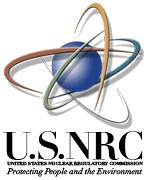Nuclear Regulatory Commission comes to Grand Rapids to discuss nuclear power in Michigan

Courtesy Photo / nrc.gov NRC logo
Oct 6, 2010
Grand Valley State University students will have the opportunity to learn more about the Nuclear Regulatory Commission and nuclear energy produced in Michigan at the Institute for Global Education at 1118 Wealthy St. SE tonight at 7 p.m. Representatives from the NRC, a federal organization, will make a presentation about their regulations and procedures followed by a Q&A session with members of IGE, the group Don’t Waste Michigan and any other audience members.
The U.S. produces almost 30 percent of the world’s nuclear-generated electricity, making it the largest contributor, according to the World Nuclear Association. Use of nuclear energy reduces the nation’s dependence on oil and also produces more environmentally-friendly energy since it does not burn other fuels. However, along with these benefits come concerns about safety in creating this energy and disposing of the radioactive waste.
NRC takes on the role of monitoring these concerns and making sure the whole process is safe for the environment and the people in the area.
“It’s important for students to learn about where you are and what is around you for your own safety and security,” said Chester Lowe, a board member of IGE who organized the event.
The nuclear power presentation will be filmed as part of the IGE’s monthly talk forum, which is broadcast on Grand Rapids public access and the Internet. Viktoria Mitlyng, NRC officer of public affairs, and John Ellegood, NRC resident inspector of a nuclear plant in Perry, Ohio, will speak at the event as well as members of Don’t Waste Michigan, an environmental group dedicated to preserving Michigan’s freshwater resources.
Lowe, a GVSU alumnus, said the NRC representatives will discuss the basics of nuclear power and waste as well as what they do to ensure safety in the production of the energy and disposal of the waste.
Michigan houses three nuclear power plants of the nation’s 104 nuclear reactors, the closest of which is the Palisades plant five miles south of South Haven.
Lowe said he has acted as a “watchdog” for the past five years working with representatives from each of the plants to make sure all regulations are followed.
“We want to make sure we have people in the right places so the wrong things don’t happen,” he said.
He compared nuclear risks to the oil spill in the Gulf of Mexico earlier this year, saying “the same type of thing can easily happen with nuclear waste.”
Chuck Miller, a member of IGE, said this presentation will be different from the previous talk forums because there are experts speaking on the topic instead of the general public hosting their own conversation. Miller does the recording and editing of the hour-long programs and said he thinks the turnout for this event will be bigger than in the past, hopefully 20 people or more.
The IGE is a volunteer organization that runs different outreach programs focused on human rights and education on multicultural and religious awareness at a local and global level, according to its website. More information is available at www.iserv.net.
The public is welcome at the free NRC presentation, and students are encouraged to attend.

























